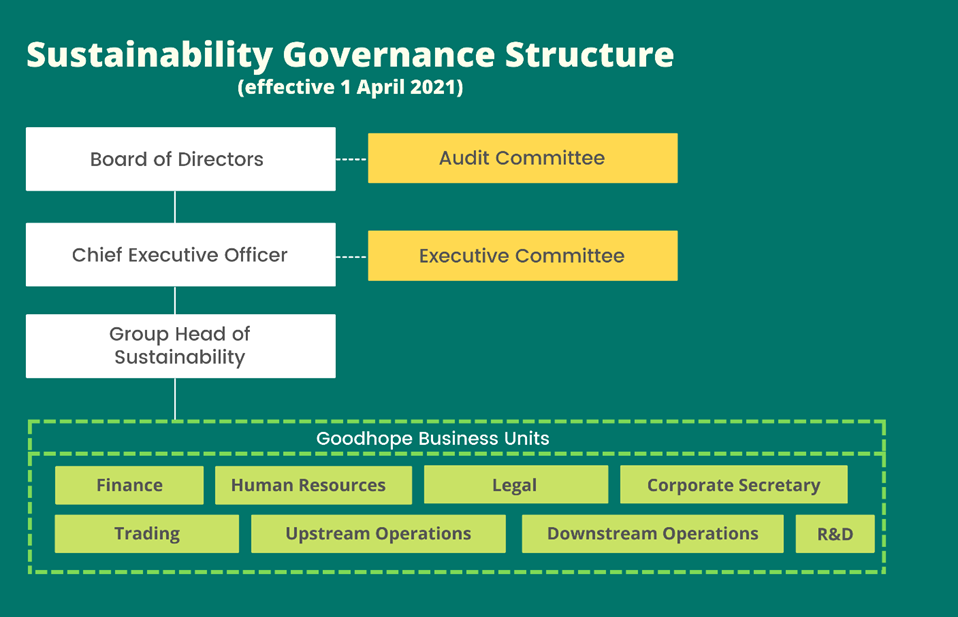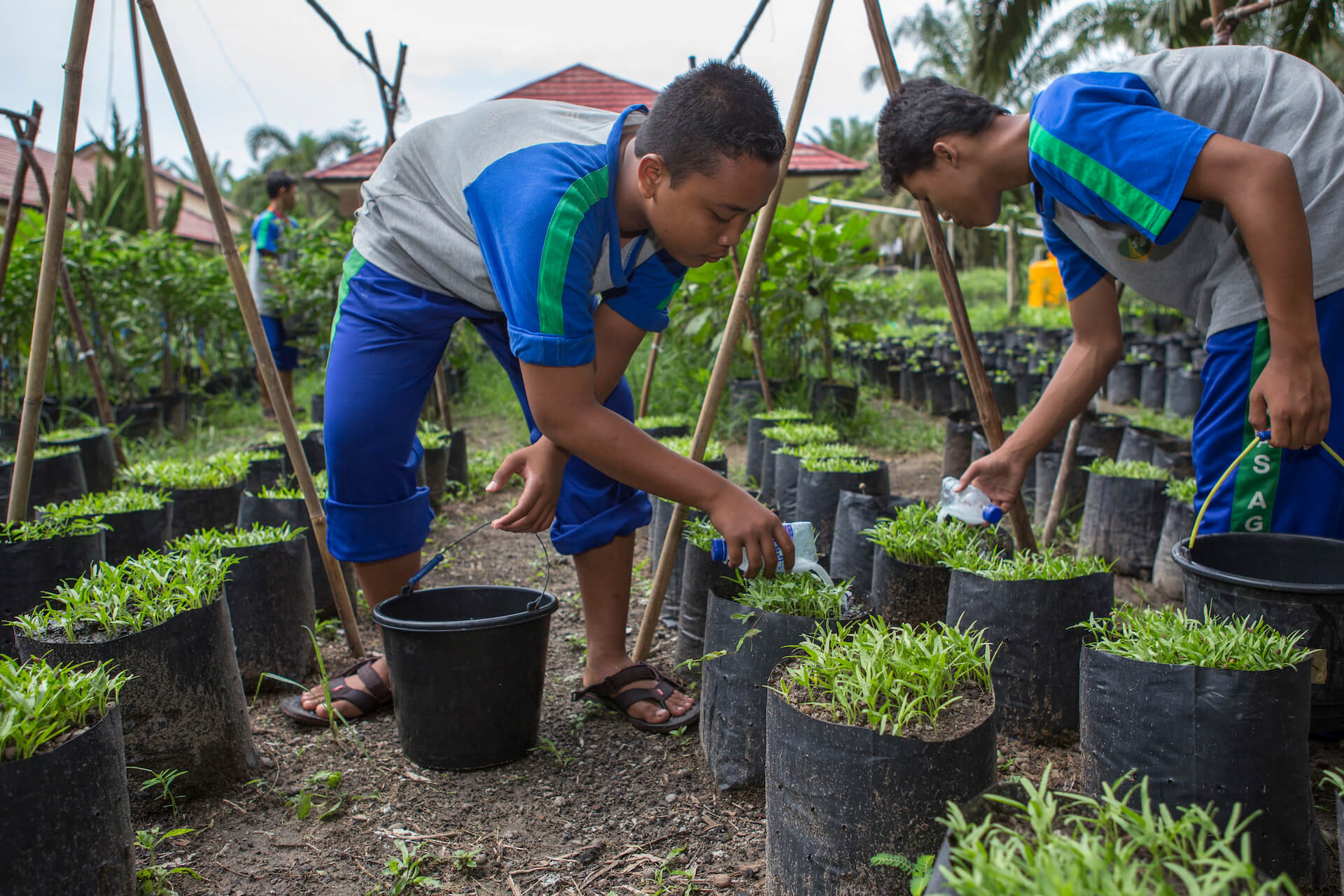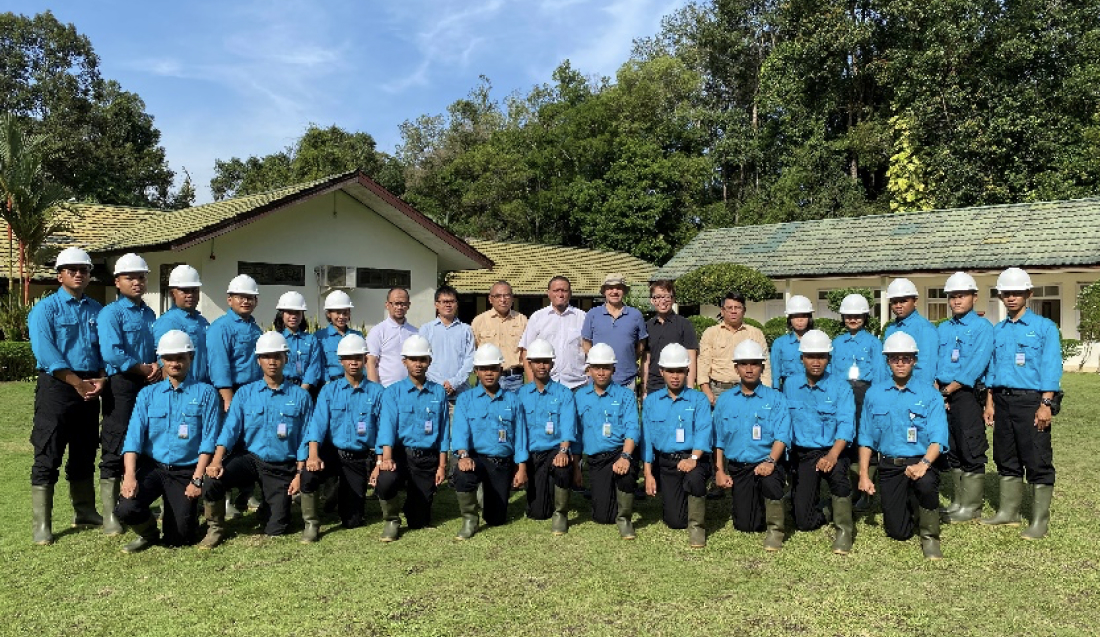Our journey to becoming best-in-class in sustainability is not an easy one, as achieving sustainability in the palm oil trade goes beyond having a global supply chain based on environmentally friendly and socially acceptable production and sourcing.
To make this industry truly sustainable, the negative social impacts of the palm oil trade undoubtedly need to be addressed. This is crucial for us as our operations impact approximately 43,000 people from 72 villages around our concessions. Naturally, a key component of our sustainability journey is ensuring that the communities surrounding our plantations enjoy good well-being and healthy lives.
To contribute to the sustainability of the palm oil trade, we leverage the collaborative power of our people and partnerships while using the latest technology.
Our Sustainability Roadmap
There are 72 villages with approximately 43,000 people living in and around our concessions. Goodhope is working to monitor and protect approximately 22,788 ha of conservation area. The size of this area represents 1/3 of our planted plantation, which totals 69,000 ha.
Goodhope’s sustainability roadmap is anchored by six pillars leveraging people, partnerships, and technology.
- 100% compliance with the highest local and international environmental, social, and governance standards.
- Resolution of remaining legacy issues to ensure our continued progress.
- Achieve 100% traceability to plantations and full compliance with our NDPE commitment on a group level and across all operations.
- Reduction of GHG emissions.
- Managing common challenges affecting areas where we operate by adopting a landscape-level approach and working together with communities, local authorities, and civil society to address these challenges in a concerted way.
- Achieve effective stakeholder engagement through transparency, inclusiveness, and regular communication.
Sustainability Milestones
Contributions to UN SDGs
The United Nations Sustainable Development Goals (UN SDGs) are the blueprint we use to address the global challenges we face in creating a more sustainable future for all. Our own sustainability performance indicators are aligned with these 10 UN SDGs ensuring that our sustainability initiatives are designed to impact them positively.

Sustainability Governance
We believe that the integration of sustainability into every aspect of our business requires committed leadership and clear direction. The key enabler to achieving this is a robust governance structure that reports directly to our C-suite leadership. Sustainability at Goodhope is governed by the Board of Directors and led by the Group Head of Sustainability, who also sits on the Executive Committee (EXCO).
Standards and certifications
Our policies are guided by international Principles and Standards including those by the Roundtable on Sustainable Palm Oil (RSPO); ISO; UN Principles; ILO Standards; High Carbon Stock Approach (HCSA) and High Conservation Value Resource Network (HCVRN).
Simply put, we are committed to doing the right thing and operate on a strict no deforestation, no peat, no human exploitation (NDPE) basis.
The Roundtable on Sustainable Palm Oil (RSPO) promotes the production of sustainable palm oil through a membership and certification system with a strong set of Principles and Criteria (P&C).
Goodhope Asia Holdings Ltd became a member of RSPO on 2 December 2014. The membership extends to all Goodhope subsidiaries, including our three initial individual members: PT Agro Indomas (RSPO member since 12th June 2006), PT Agro Bukit (RSPO member since 18th August 2006), and PT Agro Wana Lestari (RSPO member since 21st April 2014).
Five of our oil palm processing mills have been awarded RSPO Certification, while both the edible oils and fats manufacturing facilities in Malaysia have been awarded RSPO Supply Chain Certification.
The Indonesian Sustainable Palm Oil (ISPO) certification scheme is regulated by the Indonesian Ministry of Agriculture and serves as a system to enhance Indonesia’s competitiveness in the global palm oil market and reduce greenhouse gas emissions from Indonesian oil palm plantations and operations.
Premium Vegetable Oils Sdn Bhd and Premium Fats Sdn Bhd have been certified under the Malaysian Sustainable Palm Oil (MPSO) Supply Chain Certification System in November 2019.
We have adopted the international standard ISO 14001 Environmental Management System (EMS) which promotes:
- Improved environmental performance through the implementation of environmental best practices.
- Waste reduction, conservation of natural resources, and minimizing environmental impact.
- Compliance with all environmental laws, regulations, and international standards.
- Systematic continual improvement.
Currently five of the Group’s plantation subsidiaries – PT Agro Indomas, PT Agro Bukit, PT Rim Capital, PT Agro Wana Lestari, and PT Karya Makmur Sejahtera, are ISO 14001 certified.
Regular health and safety risk analyses ensure that our safety procedures are compliant with the ISO 45001 Occupational Health and Safety Management System. Currently five of the Group’s plantation subsidiaries – PT Agro Indomas, PT Agro Bukit, PT Rim Capital, PT Agro Wana Lestari, and PT Karya Makmur Sejahtera, are OHSAS 18001 certified.

Collaborations and memberships
Partnerships play an important role in helping us to launch new and innovative projects. We have been focusing our collaborations on landscape conservation, community well-being, traceability, emissions reduction, and capacity building of independent smallholders in our supply chain.
Organizations such as IDH Sustainable Trade Initiative, PILI Green Network, WRI Indonesia, Daemeter Consulting, Widya Erti Indonesia, the University of Tokyo and Ata-Marie provide expertise to help us implement practical systems for forest conservation and to improve our sustainability initiatives.
Other partners include social enterprises like Wild Asia that are helping us to research the potential of transforming oil palm estates into chemical-free, biodiverse, and regenerative agriculture farming models.

Capacity building
We established the Goodhope Academy for Management Excellence (GAME) as a training facility to enhance information exchange and learning opportunities for our staff members, the local community, and other stakeholders.
To ensure that our organization’s policy execution meets all applicable industry standards, we have invested in capacity building. The goal is to enhance skills and expertise in sustainability management. This covers training sessions on human rights, agronomy, local laws and regulations, conservation, and more. It also covers learning sessions on occupational, environmental health and safety, and certification standards.
